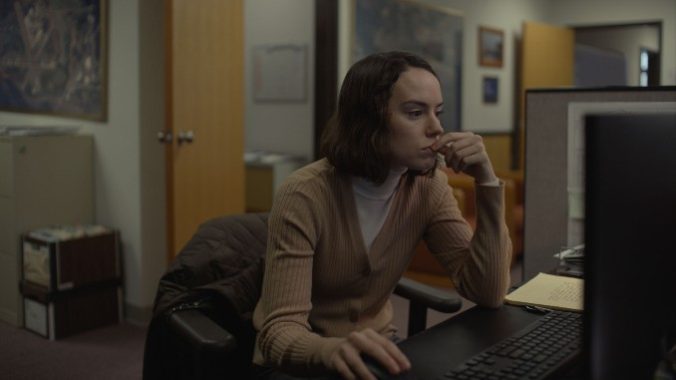Daisy Ridley Elevates the Muted Emotions of Sometimes I Think About Dying

There’s no doubt that Daisy Ridley’s talents have been underserved post-Star Wars, as she’s been relegated to dead-on-arrival blockbusters like Chaos Walking or iffy psychological thrillers like The Marsh King’s Daughter that haven’t taken full advantage of her capacity as an actress. But a movie like Sometimes I Think About Dying, where her perfectly modulated mannerisms and expressions heighten the tumultuous emotions tucked away within an understated and sober surface, especially underscores just how much more quality work Ridley is capable and deserving of.
The irony lies in how much Sometimes I Think About Dying acts as a cinematic inverse to Ridley’s Star Wars films. There, the sweeping galactic adventure, guided along by bombastic action and snarky quips, was served well by Ridley’s plucky and feisty performance as Rey. Here, she’s planted firmly on Earth as Fran, an introverted cubicle worker existing in a state all too familiar to some of us: A depressive trudge through the dim malaise of living.
Adapted from their short film of the same name by writers Katy Wright-Mead, Stefanie Abel Horowitz and Kevin Armento (itself an adaptation of Armento’s play Killers), director Rachel Lambert’s second feature (after her 2016 film In the Radiant City) subsists in the monotonous and the desultory, much like Fran herself. With her frumpy neutral-colored sweaters, unembellished shoulder-length haircut and perpetual self-muzzling, Fran seems to work overtime to slip into the background. If she’s not isolating herself at work away from the tiresome but well-meaning niceties of her co-workers, then she’s isolating herself at home, eating cottage cheese and playing Sudoku puzzles while ignoring calls from her mom. Occasionally, she’ll daydream about herself lying dead somewhere peaceful, like among the trees in a picturesque forest or on a deserted beach next to the crashing waves. Whether these fantasies are genuine suicidal ideations or a way of engaging with the kinds of stimulative emotions she shuts herself off from is up for interpretation—though, it’s likely somewhere in between.
Eventually, an outside force intrudes on her sequestered little universe. After the retirement of her coworker Carol (Marcia DeBonis), the company fills her role with Robert (Dave Merheje), an innocuous everyman who fits right in with all the other innocuous everypeople that occupy the office space. But, whereas Fran’s other coworkers seem content to pass her by without a second look, Robert pings her with some friendly messages on Slack (this is some great workplace messaging cinema) and invites her out to a movie. That slightest of efforts for someone to include her works its charms, and so begins a mild, cautious friendship-potentially-courtship, with Robert doing his best to crack open the shell of detachment that Fran shields herself with.
In a lot of ways, it would be fair why someone might want to write off Sometimes I Think About Dying as banal Sundance-core (the film garnered buzz after it premiered at the festival in 2023). It veers excessively close to both the mumblecore and self-consciously subdued drama aesthetics that have become a cliché for popular films to come out of the fest: A forcedly dramatic title; eloquent, cursive opening credits; downplayed narrative trajectory; whimsical score; a sustained series of static shots of environments and character interactions. These could all make this film feel overly, rigidly constructed. The pieces are arranged for failure.
-

-

-

-

-

-

-

-

-

-

-

-

-

-

-

-

-

-

-

-

-

-

-

-

-

-

-

-

-

-

-

-

-

-

-

-

-

-

-

-








































